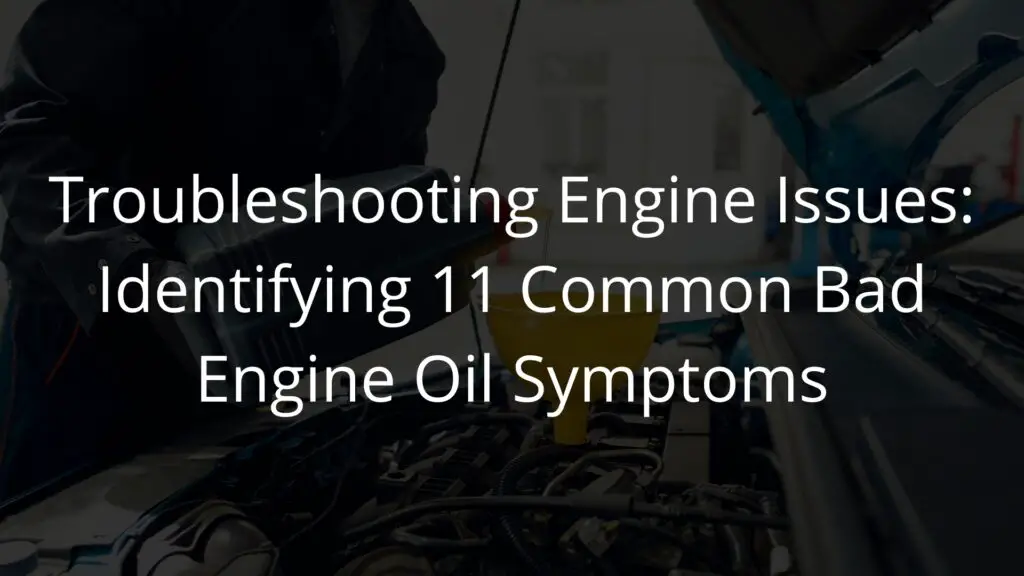Ever wondered if your car is trying to tell you something? Get ready to decode the mystery of ’11 Bad Engine Oil Symptoms’. When your engine oil goes sour, your vehicle drops hints like weird engine sounds and a thirst for fuel.
No need to panic though! Recognizing these signs can save you headaches and bucks down the road. So, stick around and become a pro at spotting when your engine oil needs a little TLC (tender loving care).
Why Does Engine Oil Go Bad?
Engine oil is a vital lubricant that keeps your car’s engine running smoothly. It’s like the bloodstream of your vehicle, reducing friction between moving parts, dissipating heat, and preventing wear and tear.
Over time, however, engine oil can deteriorate due to factors like heat, contaminants, and oxidation. As it accumulates dirt, debris, and breaks down under extreme conditions, its ability to protect the engine diminishes.
This leads to decreased lubrication efficiency, potentially causing engine components to grind against each other, generating heat, and resulting in poor performance. Regular oil changes are essential to maintain optimal engine health and prolong your vehicle’s lifespan.
Bad Engine Oil Symptoms

Your car’s engine oil might be the unsung hero of your vehicle’s performance, but when it’s not in good shape, it can lead to a range of problems that are hard to ignore. So, whether you’re a car enthusiast or just someone who relies on their vehicle for daily commuting, knowing these 11 bad engine oil symptoms can help you take better care of your ride.

1. Check Engine Light
The check engine light is like a silent messenger that pops up on your dashboard when something isn’t right under the hood. While it could indicate various issues, bad engine oil can trigger this warning. It’s your car’s way of telling you that it’s time to give your engine oil some attention.
2. Low Oil Pressure Warning
A sudden warning light or gauge indicating low oil pressure should set off alarm bells. Low oil pressure can occur due to insufficient or degraded engine oil, which can’t provide proper lubrication and cooling. Ignoring this warning can lead to severe engine damage.
3. Blue or Grayish Exhaust Smoke
Seeing blue or grayish smoke billowing from your exhaust pipe is never a good sign. It could be a sign that engine oil is getting into the combustion chamber and being burned along with fuel. This can happen when engine oil leaks or when the oil has broken down excessively.
4. Dark and Dirty Engine Oil
Healthy engine oil is typically amber in color. If you check your oil dipstick and find the oil is dark, dirty, or even sludgy, it’s a red flag. Dirty oil doesn’t lubricate effectively and can lead to increased engine friction and wear.

5. Engine Knocking
When your engine starts making knocking or ticking noises, it’s a clear sign that something’s not right. Engine knocking often indicates poor lubrication. If the oil isn’t doing its job of reducing friction between moving parts, it can lead to knocking sounds as components collide.
6. Burning Oil Smell
If you notice a burnt, oily smell coming from your engine, it could mean that oil is leaking onto hot engine parts. This can happen due to worn-out gaskets or seals, causing oil to escape and burn on contact with hot surfaces.
7. Engine Stalling
A car engine that stalls frequently could be suffering from inadequate lubrication. As the engine struggles to perform without proper oil coverage, it might lose power and eventually stall, leaving you stranded.
8. Excessive Mileage
While oil does degrade over time, high mileage exacerbates this process. If you’ve traveled a substantial distance since your last oil change, the oil might have lost its effectiveness in maintaining engine health.
9. Overheating
Engine oil plays a crucial role in cooling your engine by carrying heat away from critical components. If the oil isn’t up to the task, your engine might start to overheat, leading to potential damage and expensive repairs.
10. Poor Fuel Economy
Bad engine oil can negatively impact your car’s fuel efficiency. When the engine doesn’t receive proper lubrication, it needs to work harder, which can result in increased fuel consumption.
11. Engine Oil Leaks

One of the most apparent signs of bad engine oil is spotting oil puddles under your car. Leaks can stem from degraded gaskets, seals, or other engine components that are no longer effectively containing the oil.
How Long Can You Drive With Bad Engine Oil?
Driving with bad engine oil is a risky gamble. Depending on the severity of the issue, you might experience immediate problems or gradual deterioration. In the short term, your engine’s performance could suffer, leading to reduced fuel efficiency, increased emissions, and potential knocking sounds.
However, over the long term, continued driving with bad engine oil can cause significant damage, such as engine overheating, increased wear on vital components, and even complete engine failure. It’s best to address bad engine oil symptoms promptly and avoid driving for an extended period without proper oil maintenance to prevent costly repairs.
Tips to Extend the Lifespan of Your Engine Oil
To maximize your engine oil’s lifespan, follow these tips. Firstly, adhere to your manufacturer’s recommended oil change intervals. Keep your engine clean to prevent contaminants from degrading the oil. Regularly check oil levels to ensure they’re within the safe range. Opt for high-quality oil and filters.
Drive smoothly to reduce engine stress. Maintain proper coolant levels to prevent overheating. Address any oil leaks promptly to avoid oil loss. By following these steps, you’ll ensure your engine oil remains effective in lubricating and protecting your engine, ultimately extending its lifespan and preserving your vehicle’s performance.
Final Thoughts: Engine Oil Woes — Exploring 11 Bad Engine Oil Symptoms
In the intricate world of car maintenance, recognizing the 11 bad engine oil symptoms can make a world of difference. From mysterious engine noises to unwelcome exhaust smoke, these signals speak volumes about your engine’s health.
Don’t ignore the check engine light or low oil pressure warning—they’re your car’s SOS signals. Remember, bad engine oil isn’t just about poor performance; it can lead to costly repairs. Stay vigilant, tend to your engine oil, and ensure your ride stays smooth on the road ahead.
For more information, explore our blog on all things engine oils.



